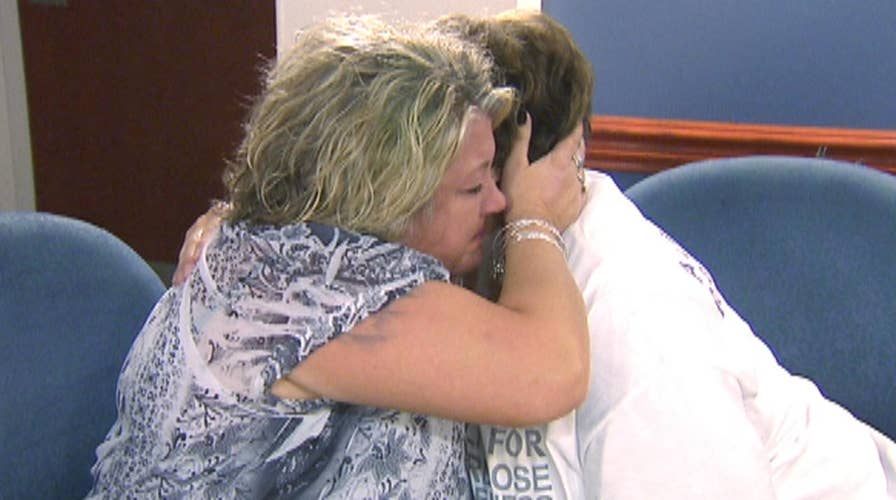Families of overdose victims find comfort in support group
Rick Leventhal reports on opioid epidemic
"She wanted to live. She tried so hard…”
With tears flowing down her cheeks, Lisa Appenzeller clutched a photo of her daughter Jessica, who died of a drug overdose at the age of 22. Lisa found her on the bathroom floor, another victim of the opioid crisis that claims tens of thousands of lives every year. Jessica tried to get clean, her mother says, going to rehab twice, but the drug’s pull was too strong. Her dealer lived two blocks away and fronted her two pills of Fentanyl, an opiate up to 50 times stronger than heroin. Jessica left behind a 3-year-old daughter, and a mother who still searches for answers, eight months after her death.
“I miss her every minute… but she’s in my heart,” Lisa said, choking up.
Lisa was comforted by Carol Coolbaugh, who lost her son Eric to a heroin overdose eight years ago. To help deal with the pain, Carol started a support group. They meet once a month in a hospital conference room in Northeastern Pennsylvania, but the session could take place almost anywhere in America.
The opioid crisis affects people from every socio-economic background in every state, afflicting every race, creed and color, from teenagers to senior citizens who often get hooked on pain pills prescribed for an injury or after surgery and then move on to heroin when they can’t get their prescriptions refilled or can’t afford the pills on the street. Heroin offers a powerful alternative at a much cheaper price, as little as $5 a bag, but it’s often cut with Fentanyl, with deadly results.
The coroner of Luzerne County, where Eric and Jessica both died, calls the epidemic “shocking, surprising, out of control and frustrating.”
“This has absolutely become routine” Coroner William Lisman told Fox News, about the OD calls his office responds to. “Just another day in the office, just another phone call on the weekend that we say put the body in the morgue and we will get to the blood work on Monday morning.”
Related stories:
Lisman, who started working for the county in the 70s, said back then they might have seen one drug overdose death a month. There were at least nine suspected OD’s in the first 19 days of this year.
Back in the hospital conference room, Maureen Kacillas remembers her 21-year-old son, Justin, and talks about the importance of sharing the pain with others.
“If you haven’t lost a child, you don’t get it…” she said. “There is no judging, no shame… we are trying to erase the stigma."
Across the table, Judy Rosengrant holds a framed photo of her son David, who was 35 and went to rehab seven times trying to kick his heroin habit.
"I found a letter David wrote me in 2013 in one of my purses” Judy told the group. “He said ‘I am so sorry, like I do so well and I keep hurting you and your family and I don't want to be a scumbag drug addict, I don't want to be that, I love everyone.' And he always said to me 'If I overdose again I'd rather die, I can't put everyone through this another minute.'"
More than a dozen heads nod in understanding and sympathy.
Jennifer Coolbaugh, Carol’s daughter, was also at the meeting. A recovering addict herself, she said people cannot understand the drug’s tremendous pull unless they’ve experienced it themselves. She said she wishes so badly she could have saved her brother from the demons. But she found out firsthand why it was so hard for him.
"I knew exactly what I was doing but I couldn't figure out how to stop,” she said. “It was terrifying."
Jennifer said the focus needs to shift from victims to survivors. She said mourning is important, but hopes the world will pay more attention to helping those in the Opioid’s spell. She believes treatment works, that it saves lives, but that it must be longer than 28 days.
She said she knows staying sober requires great strength, hard work and true perseverance, and she’s determined to stay clean.
"I have more feelings of happiness now... and pure joy,” she said. “I've never felt that kind of happiness before. I'm not losing that."
Fox News producer Shira Bush contributed to this report.









































